Nestled in the captivating Solukhumbu region of Nepal, Mt. Abi stands tall at an impressive 6,097 meters, beckoning adventurous climbers seeking to challenge themselves on its technical slopes. This peak offers a unique opportunity to hone ice climbing skills and acclimate to high altitudes, all while immersing oneself in the region’s remote villages and breathtaking vistas. With a 12-day expedition that includes the formidable Cho La Pass, climbers who are properly prepared can revel in the thrill of summiting Abi Peak and witnessing the majestic panorama of the Himalayas. But the journey is not without its challenges, as climbers must navigate through…
Key Points
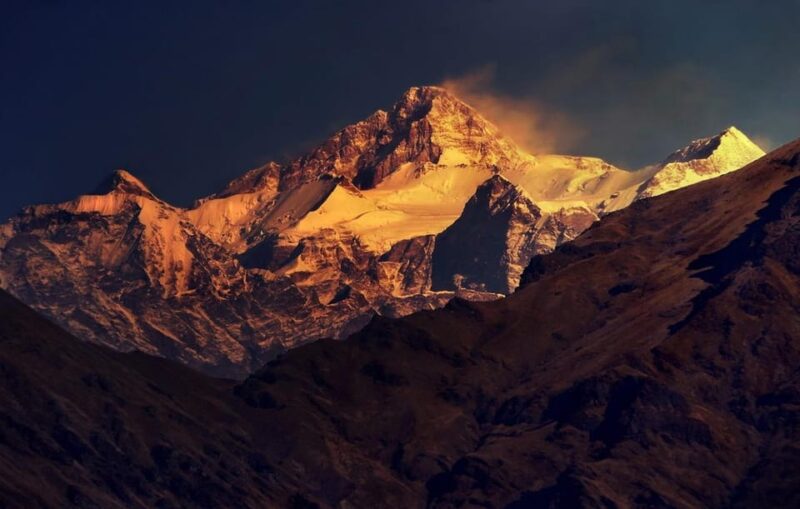
- Abi Peak is a 6,043-meter mountain in the Solukhumbu region of Nepal, suitable for practicing ice climbing and acclimatization.
- The expedition to Abi Peak typically lasts 12 days and costs $4,591.77 per person, with a free cancellation policy.
- The itinerary includes a flight from Kathmandu to Lukla, followed by a trek through scenic villages and the crossing of Cho La Pass.
- Moderate ice climbing skills are required, and the expedition is designed for effective acclimatization to high altitudes.
- The expedition includes hotel accommodation in Kathmandu, meals, and necessary permits, but excludes personal transportation, gear, and emergency evacuation services.
Abi Peak Climbing Overview
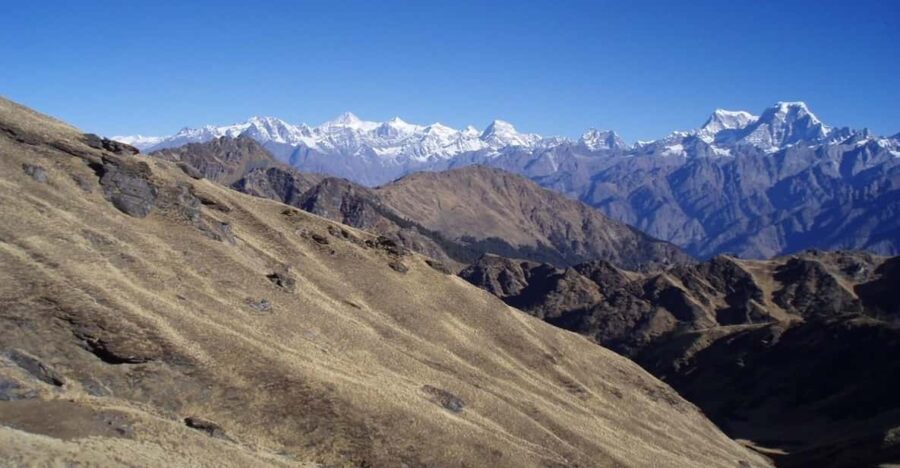
Situated in the Mahalangur region of the Solukhumbu district in Nepal, Abi Peak stands tall at an impressive height of 6,043 meters, with its summit reaching 6,097 meters.
This peak is an ideal destination for those seeking to practice ice climbing skills and acclimatize before attempting higher peaks. The entire climbing expedition spans 12 days and comes with a price tag of at least $4,591.77 per person.
Visitors can take advantage of the free cancellation policy up to 24 hours in advance. With its technical sections and the challenging Cho La Pass at 5,420 meters, Abi Peak offers a rewarding and scenic climbing experience for the adventurous.
You can also read our reviews of more tours and experiences in Namche Bazar.
Itinerary Highlights
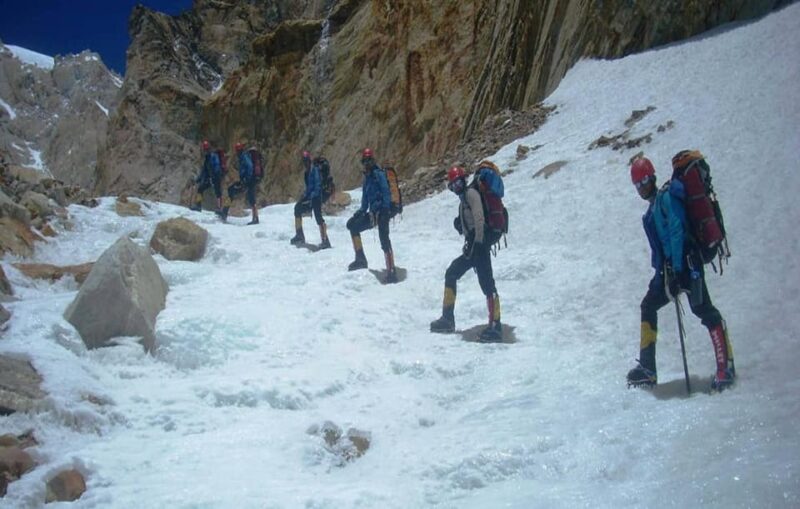
The itinerary for the Abi Peak climbing expedition kicks off with a flight from Kathmandu to the renowned Lukla airport, followed by a trek that takes climbers to the village of Chutanga on the first day.
Over the next few days, the route leads to Thuli Kharka or Chatra La, then onwards to Kothe and Thangnak, before reaching the Abi Base Camp at an elevation of 5,355 meters on day five.
The expedition then advances to High Camp at 5,610 meters, setting the stage for the summit push to the top of Mt. Abi Peak at 6,097 meters on day seven.
- Traverse the challenging Cho La Pass at 5,420 meters
- Enjoy a scenic flight to and from Lukla
- Optional hike to Gokyo-Ri for stunning Everest views
Climbing Experience
The Abi Peak climbing expedition requires moderate ice climbing skills to navigate the technical sections.
Trekkers will need to cross the challenging Cho La Pass at an elevation of 5,420 meters.
The scenic flight from Kathmandu to Lukla and back offers breathtaking views of the Himalayas.
For those seeking a more extensive experience, an optional hike to Gokyo-Ri provides panoramic vistas of Mount Everest, Lhotse, Makalu, and Cho Oyu.
The expedition’s itinerary is meticulously designed to facilitate acclimatization, allowing climbers to safely reach the Abi Peak summit at 6,097 meters.
With the guidance of experienced trekking and climbing professionals, this adventure promises an unforgettable experience in Nepal’s stunning Mahalangur region.
Inclusions
Typically, the Abi Peak climbing expedition package includes a range of essential services and equipment. These cover land transportation, accommodation, meals, professional guides, and permits.
Notably, the package provides:
- 4 nights of hotel accommodation in Kathmandu with bed and breakfast
- Major meals (breakfast, lunch, and dinner) and accommodation in teahouses and tents during the trek
- A professional trekking and climbing guide, cook, and porters (1 porter per 2 members)
- Charges for climbing equipment as well as life insurance for the support crew
- Necessary permits, including the Abi Peak permit, Khumbu Pasang Lhamu Rural Municipality fees, and Sagarmatha National Park permit.
Exclusions
In contrast to the inclusions, the Abi Peak climbing expedition package doesn’t cover certain expenses.
Personal transportation to and from the airport is an additional cost. Meals during the Kathmandu stay aren’t included, so climbers must budget for those. Participants are responsible for providing their own personal trekking and climbing gear.
Emergency evacuation services, if needed, are also not part of the package. Plus, the cost of drinks beyond tea and coffee is excluded.
Airfare to and from the country, Nepal entry/re-entry visa fees, and international airport departure taxes are the responsibility of the climber. Personal travel insurance is also not provided.
- From Kathmandu: Luxury 16 Days Everest Base Camp Trek
- Everest Base Camp Trek – 12 Days
- Everest View Trekking, Everest Panorama Trekking in Nepal
- From Kathmandu: 12 Day Amazing Everest Base Camp Trek
- Nepal: Everest Base Camp Trek With Helicopter Return
- From Lukla: 11 Day Everest Base Camp With Kala Patthar Trek
Preparation for the Trek
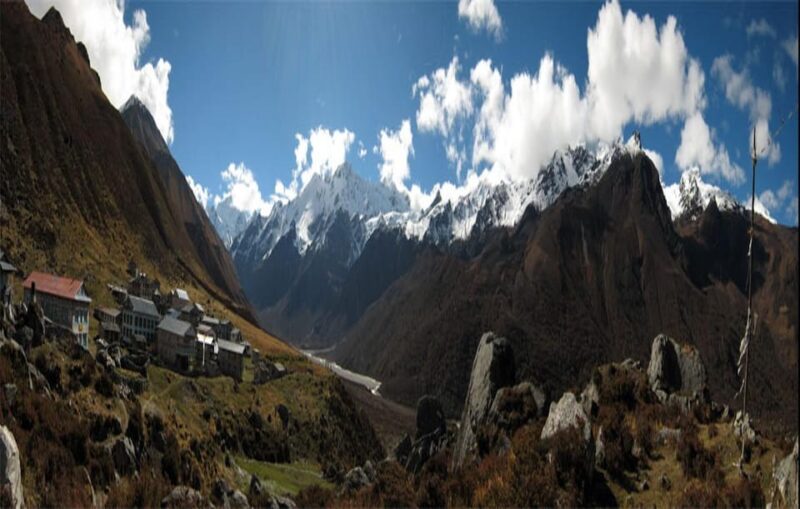
Proper preparation is essential for successfully tackling the Abi Peak climbing expedition. Climbers must ensure they’re physically and mentally ready for the demanding trek. This includes building endurance through cardio exercises, strengthening core muscles, and practicing with the necessary gear.
Plus, climbers should familiarize themselves with the itinerary and plan accordingly:
- Research the terrain, weather conditions, and altitude changes to pack the right clothing and equipment.
- Obtain proper permits and visas well in advance.
- Arrange for comprehensive travel insurance that covers emergency evacuations.
With diligent preparation, mountaineers can confidently embark on this thrilling adventure and reach the summit of Abi Peak.
Safety Considerations
Safety is paramount when undertaking the Abi Peak climbing expedition. Proper equipment and safety protocols are crucial to mitigate risks. Climbers must be equipped with sturdy crampons, ice axes, harnesses, and ropes for navigating the technical sections.
Acclimatization is vital, as the high altitudes can pose serious health challenges. Guides are trained in first aid and carry emergency supplies, including oxygen, in case of altitude sickness or other medical emergencies.
Weather conditions can change rapidly, so climbers must be prepared to adjust their plans accordingly. Teamwork and communication among the group are essential for a safe and successful climb.
Memorable Experiences
Climbers embarking on the Abi Peak expedition are rewarded with a breathtaking journey through Nepal’s stunning Solukhumbu region.
From the dramatic flight over the Himalayas to Lukla, to the culture in remote villages, the Abi Peak experience offers indelible memories.
Notable highlights include:
- Trekking through the serene Khumbu Valley, flanked by majestic peaks
- Summiting the challenging Abi Peak (6,097m) and savoring the panoramic views
- Exploring the picturesque Gokyo Lakes and hiking to the iconic Gokyo Ri for a once-in-a-lifetime view of Mount Everest and its neighbors
The Abi Peak climb delivers a true Himalayan adventure, blending technical mountaineering with the rich cultural tapestry of Nepal.
Frequently Asked Questions
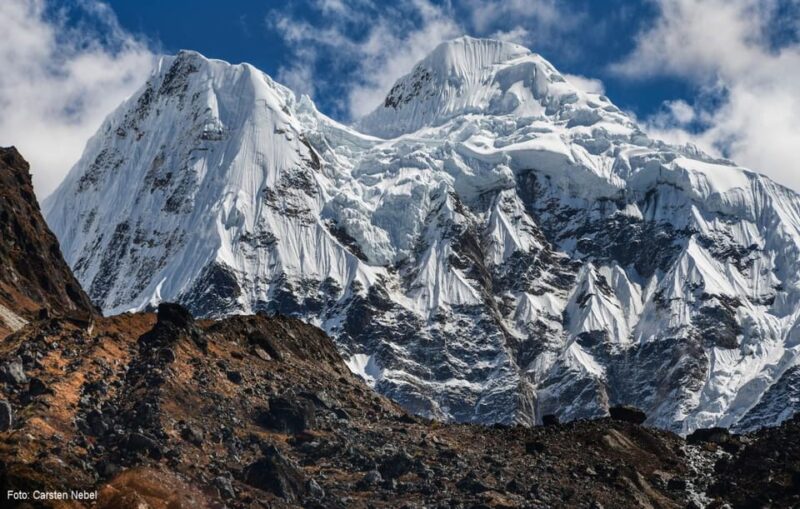
What Is the Best Time of Year to Climb Mt. Abi?
The best time to climb Mt. Abi is during the spring and fall seasons, when weather conditions are most favorable. Climbers can expect clear skies, moderate temperatures, and stable snow and ice conditions during these peak climbing periods.
Can Porters Carry Personal Belongings During the Trek?
Porters can carry climbers’ personal belongings during the trek to Mt. Abi Peak. The itinerary includes 1 porter per 2 members to assist with carrying equipment and supplies throughout the 12-day climbing expedition.
Are There Any Cultural or Religious Sites Along the Route?
While the trek to Abi Peak doesn’t include any major cultural or religious sites, climbers may catch glimpses of traditional Sherpa villages and monasteries along the way, adding to the overall culture of the experience.
How Challenging Is the Descent From the Summit?
The descent from the summit is demanding but with proper precautions, it’s manageable. Climbers must navigate steep, icy terrain and be prepared for potential fatigue and hazardous conditions. A skilled guide is essential to ensure a safe return.
Can I Rent Climbing Gear in Kathmandu Before the Trek?
Yes, climbers can rent high-quality climbing gear in Kathmandu before the trek. Many local gear shops offer a wide selection of equipment, ensuring climbers are well-equipped for the technical sections and challenges of the Abi Peak expedition.
Recap
Scaling the magnificent Abi Peak offers adventurous climbers a chance to hone their ice skills and acclimatize amidst the breathtaking Himalayan vistas. The 12-day expedition presents technical challenges like the Cho La Pass, but with proper preparation, climbers can savor the thrill of conquering this peak and witnessing the awe-inspiring panoramas of the Solukhumbu region. The journey promises an immersive cultural experience and lifelong memories in this captivating corner of the Himalayas.
You can check availability for your dates here:More Tour Reviews in Namche Bazar
Not for you? Here's more things to do in Namche Bazar we have recnetly reviewed
- 4 Best Tours In Namche Bazar
- 6 Best Helicopter Flights And Tours In Namche Bazar
- 8 Best Hiking And Trekking Tours In Namche Bazar
- Mt.Phari Lapcha Peak Climbing
- Mt.Kyazo Ri Peak Climbing
- Everest Base Camp Tour
- Everest Base Camp Trek 12 Days
- Everest Base Camp Trek With Helicopter Return
- Lobuche East Climbing
- Ride Horse to Everest Base Camp
- Everest Three High Passes Trek: 17-Day Guided 3 Passes Trek
- Mt.Ombigaichen Peak Climbing
